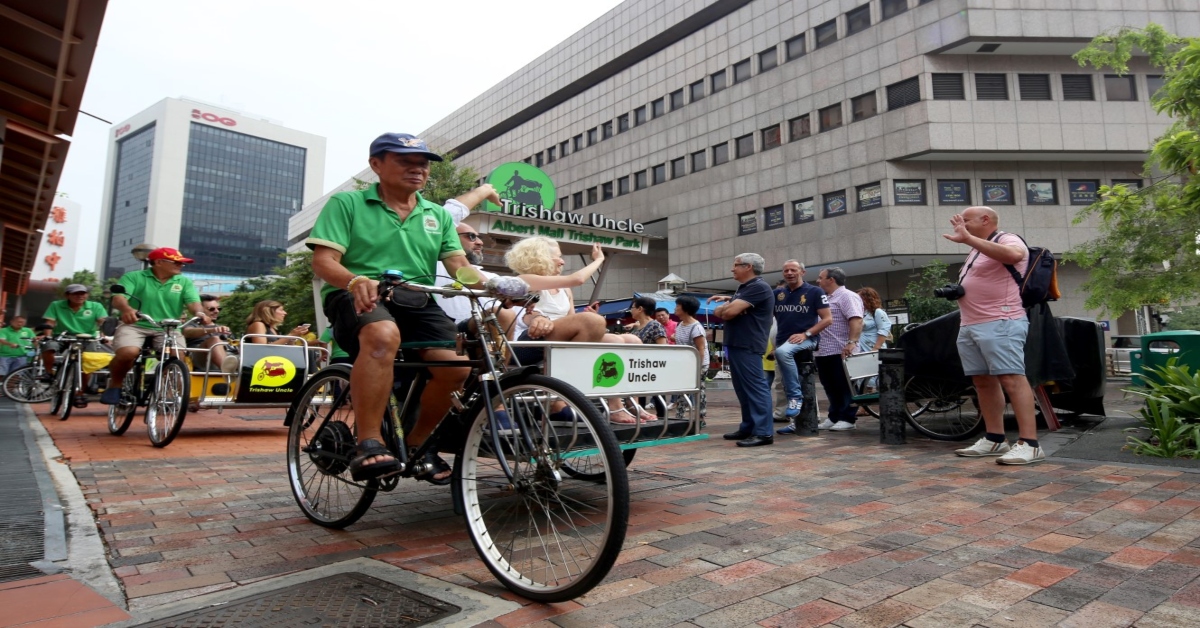What do you think of a job that pays you basic salary of $3,800 a month? That’s higher than the median starting salary of a university graduate (which was $3,300 in 2015). Not bad, right? You know what job pays that much?
Being a security officer. But… Not in Singapore. In Sweden.
We recently found out that Singapore is one of the few places where being a security officer is considered a low-wage, dead-end job. In countries like Sweden and Australia, being a security officer is a well-respected career that pays decent wages. How do they do that? And why is the situation so dismal for security officers in Singapore?
There was a learning journey at the headquarters of Certis Cisco on Wednesday morning. The security firm has adopted what it calls a “design thinking framework” and the learning journey was to showcase how smart technology can enhance security with less manpower.
The mainstream media was there to cover the event, and you can read about it here.
What we are more curious about are how Singapore is not safe, why our security officers earn so little for so long and what’s being done to address the issues.
So we sat down with Mr Steve Tan, executive secretary of the Union of Security Employees (USE) to find out more about the evolving landscape of the security industry.
These are some of the interesting things that we learnt.
Most Security Agencies Sell Only One Product
There are about 250 security agencies in Singapore. They get most of their revenue from selling a single product – warm bodies.
That’s right. They sell people.
The service buyer, usually a building or property owner, tells the security agencies how many security officers are needed. The security agencies then quote a price per security officer. The security agency increases its profit by selling more security officers, securing a higher price per security officer, and reducing the pay of the security officer.
There are two perverse outcomes of such a model.
Firstly, this model results in low salaries of security officers. Mr Steve Tan told us that for the last 15 years, the median basic salary of a security officers had been about $500 a month. With overtime pay, the median gross salary of security officers has been about $1,100 a month.
FOR THE LAST 15 YEARS.
Things only started to change when it was announced in 2014 that the Progressive Wage Model (PWM) for the security sector was to be incorporated into the licensing regime.
In other words, if a security agency wants to renew its license (annual basis), it has to comply to the wage, training, and progression model spelt out by the PWM.


Since the announcement of the PWM for security sector – which has taken effect fully since 1st September 2016 – the wages of security officers have finally risen to more decent levels.
The basic monthly wage of security officers have risen to $1,100. With overtime pay and other bonuses, the gross salary of a security officer is now about $1,800 a month or more.
The second perverse outcome of the current operating model of security agencies is that increases in productivity, either through technology or training, actually hurt the profitability of security agencies. The service buyers just want warm bodies.
Never mind what technology is available. Never mind that a security agency can secure the building with less manpower. Never mind that technology can possibly secure the building more effectively than a team of overworked and underpaid security officers.
The service buyers are only willing to pay for warm bodies. So the more warm bodies the security agencies can sell, the more the money the security agencies make.
Why then would any security agency try to improve productivity through technology, training, or changes in work flows? And why then would any ambitious young man want to join the industry? Low pay, extremely long hours, and with little progression in sight.
That is where something like PWM is needed to force a change in mindset of both service buyers and security agencies.
The Current PWM Is Only A Start
Not all security officers are equal.
There are about 43,000 security officers in Singapore. Some are less physically fit. Others can outrun most people. Some have more experience. Some may be really good with leading people. Some may have a good head for systems thinking. Some younger, brighter minds might even want to go into cyber security. Or security planning and systems design.
So many different talents, so many different aspirations. That’s why Mr Steve Tan is convinced that we shouldn’t have a one size fits all approach.
The current PWM provides for progression only for those who want to take on command responsibilities. It allows security officers to move on to supervise other security officers, and be in charge of planning.
The PWM currently has five steps.
Mr Steve Tan calls this the command track. He thinks that it’s a good start. But not enough. He feels that there should be more steps to allow for security officers who are keen to be on the command track to move further up.
Mr Steve Tan is also realistic.
There are some less skilled and less ambitious security officers who are only capable of doing a jaga (i.e. watchman) job. They can’t do much more than that. They can walk around the property, look out for possible security breaches, and call in additional support if necessary.
But that’s about it.
For this group, Mr Steve Tan thinks that we may not need to require them to keep upgrading. It suffices to ensure that they have some basic skills, and mandate that they are paid decent living wages. Perhaps provide them with two steps of progression. And if they are happy with that, leave them be. After all, there will be smaller companies or buildings that require just that.
Then there are security officers who may not want to be commanding or supervising other people. But they want to and are capable of doing more.
Mr Steve Tan firmly believes that we should cater to the different talents and aspirations of these security officers. That’s why Mr Steve Tan and his colleagues in the USE are working hard together with a handful of positive-minded and visionary security agencies to develop models similar to the current PWM, but for different tracks.
For instance, the Soverus Group recently unveiled their Security Specialist Vocational Scheme (SSVS) that was developed together with USE. As reported by CNA:
“The scheme will give security officers from the group training opportunities to help them move within the company’s diversified line of business, with potential career tracks including security consultancy, security software engineering and cyber security.”
Security officers in Soverus Group with the aspiration and potential are not just restricted to moving upwards in the command track. They can switch tracks and do other aspects of security.
Why does the USE want to work with these security agencies to develop these different tracks? Mr Steve Tan gave a very simple answer:
“Choices.
We want to give security officers more choices to develop themselves and progress in their careers. If they only have one track to move up on, they have no choice. Then what about those who can’t or don’t want to move up on that single track? But with more choices, we can take care of more security officers and allow more security officers to have better jobs, better pay.”

More Needs To Be Done
When these changes come to fruition, the lives of our lot of security officers will certainly be greatly improved. But what’s in it for the security agencies? Why should they do it? If the service buyers don’t change their mindsets, there is still very little reason or incentive for security agencies to change.
And why should service buyers change?
Simple. Only by changing will service buyers be able to keep the cost of security manageable.
With the current model of headcount-based way of specifying contracts, it is estimated that we need an additional 15,000 security officers. Yes, the other way to phrase this is Singapore is short of 15,000 security officers.
It’s a rather scary thought, no?
While many security agencies are lobbying the government to allow them to employ more foreigners. The government has refused to accede to their request. Currently under Singapore Law, only Singaporeans, PRs and Malaysians with “Certificate of Good Conduct” issued by the Malaysian Government can work in this sector.
With an ageing population and low birth rates, it is likely that the number of security officers will fall and continue to fall. And given today’s security climate, there will be an increasing demand to ensure that properties and facilities are indeed secure. When supply drops and demand stays constant or increases, the price will only head in one direction – up.
But it doesn’t have to be that way.
Sweden has a population of 9 million. They have 20,000 security officers. And that is enough. Why would Singapore, with a population of 5.6 million, need 60,000 security officers? If we are able to use the appropriate technology, and redesign work methods intelligently, it is possible to properly secure the buildings, properties and facilities with less manpower and at a lower cost.
One example was what CapitaLand Malls did. CapitaLand Malls changed the way they procure security services.
For one, they have moved away from contracts that have to be renewed yearly to contracts that have longer tenures. This allows CapitaLand Malls to work closely with Certis Cisco to redesign the way they provide security for their buildings, have better trained security officers, and adopt appropriate technology. With the longer tenure, it makes sense to invest in better technology, better systems. The relationship has also progressed from that of a vendor to a partner. In so doing, they are able to cut down the number of security officers needed by 20%.
If more service buyers are like CapitaLand Malls, then there will be an incentive for security agencies to invest in technology and training. They could then provide sufficient or even better security with less manpower. They won’t need to employ more foreigners. The number of Singaporean security officers would be enough. And then security agencies would be able to pay the security officers more, without compromising their profitability.
There will also be real progression opportunities for the security officers too!
But, Why Should We Care?

Most of us aren’t affected by what happens in the security industry, right?
Wrong. We are.
We would all be terribly worried if our buildings aren’t certified to be safe. Thankfully, every single building in Singapore has to be certified by the Building and Construction Agency (BCA) to be safe before people can move in.
But not every single building in Singapore is certified to be secured.
Currently, owners of buildings, properties or facilities can opt to get a security assessment to find out what is needed to provide adequate security. Most owners opt NOT to get a security assessment. They merely do a guesstimate of how many security officers are needed.
Is that ok? Many seem to think so. Singapore is so safe! There’s the police!
But the police are already over-stretched. In 2014, then Police Commissioner Ng Joo Hee said that we needed another 1,000 police officers to give the force “much needed strategic depth”.
That was in 2014, when the threat of terrorist attacks wasn’t as imminent. Now, with the threat of terrorist attacks “at the highest level in recent times“, it would be extremely naive to think that the police force alone can provide all our security needs.
Mr Steve Tan thus hopes that the police can see security agencies more as partners rather than just targets to regulate against. He also thinks that, given the current security climate, it would make sense for the government to mandate that every building, property, and facility gets a security assessment.
If we are still not convinced that we need to be concerned about how the security industry evolves, then that’s truly scary.
What will it take before we start caring about the people who are supposed to secure the buildings we work and live in? A bomb going off, killing tens or hundreds or thousands of people? Will it be too late?
Let’s hope we never get to that.
This article was contributed by Unscrambled.sg.
Feature Image Credit: Flickr/Zenowai








